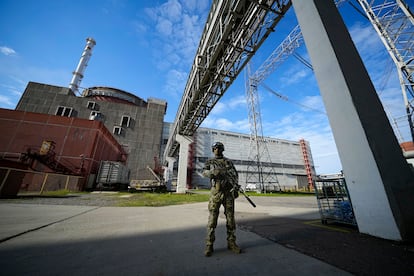U.N. atomic chief pursues Ukraine nuclear plant security deal
International Atomic Energy Agency Director General Rafael Mariano Grossi said he has narrowed months-long negotiations to protect Europe’s largest nuclear power facility

The head of the U.N.’s atomic energy watchdog returned Wednesday to Ukraine’s Zaporizhzhia Nuclear Power Plant, Europe’s largest atomic power generator, and said he has narrowed months-long negotiations to establish security to the plant itself, rather than the surrounding area.
International Atomic Energy Agency Director General Rafael Mariano Grossi has struggled to reach an agreement with Russian and Ukrainian authorities to secure the plant, which has been hit several times during the Ukraine war — though there have been no reported hits to the reactors. The facility has also suffered repeated losses of external power needed to cool its six shut-down reactors. Grossi crossed the war’s front lines for a second time to reach the plant, which is located in a partially Russian-occupied part of Ukraine where combat has intensified.
The IAEA, based in Vienna, Austria, has been rotating inspection teams at the plant for months. Grossi told The Associated Press in an interview Tuesday it’s his duty to ramp up talks between Kyiv and Moscow aimed at safeguarding the facility and avoiding a catastrophic accident. He said a deal was “close.”
Grossi met Monday with Ukrainian President Volodymyr Zelenskyy and said he would “most probably” head to Moscow in the coming days.
However, Zelenskyy said in a separate interview with the AP that he was less optimistic a deal was near. “I don’t feel it today,” he said.
Grossi has long called for a protection zone around the plant, but a deal has been elusive. Ukraine insists all Russian forces must leave the facility. Grossi told reporters at the plant on Wednesday he was working on “realistic measures” and had narrowed the scope in the hopes of reaching agreement on a mutually acceptable plan.
“Initially we were focusing on the possibility of the establishment of a well determined zone around the plant,” Grossi said at a press conference. “Now the concept is evolving. It’s refocusing more on the protection itself, and the things that should be avoided, for example, in order to protect the plant, rather than on territorial aspects, which pose certain problems.”
He didn’t specify what problems would be involved in a broader protection zone but said: “We’re not going to have a fortress here.” He said his main goal is to gain agreement on principles and “commitments not to attack the plant.”
The Kremlin’s forces took over the plant after Russia’s full-scale invasion in February 2022. Zelenskyy opposes any proposal that would legitimize Russia’s control.
The negotiations are specific to preventing a nuclear disaster at the plant and not aimed at securing a broader cease-fire, Grossi told the AP.
Interruptions to the outside electricity supply due to the fighting required plant personnel to switch to emergency diesel generators six times during the 13-month war. When backup power supplies might be needed again is unpredictable, according to Grossi.
Sign up for our weekly newsletter to get more English-language news coverage from EL PAÍS USA Edition
Tu suscripción se está usando en otro dispositivo
¿Quieres añadir otro usuario a tu suscripción?
Si continúas leyendo en este dispositivo, no se podrá leer en el otro.
FlechaTu suscripción se está usando en otro dispositivo y solo puedes acceder a EL PAÍS desde un dispositivo a la vez.
Si quieres compartir tu cuenta, cambia tu suscripción a la modalidad Premium, así podrás añadir otro usuario. Cada uno accederá con su propia cuenta de email, lo que os permitirá personalizar vuestra experiencia en EL PAÍS.
¿Tienes una suscripción de empresa? Accede aquí para contratar más cuentas.
En el caso de no saber quién está usando tu cuenta, te recomendamos cambiar tu contraseña aquí.
Si decides continuar compartiendo tu cuenta, este mensaje se mostrará en tu dispositivo y en el de la otra persona que está usando tu cuenta de forma indefinida, afectando a tu experiencia de lectura. Puedes consultar aquí los términos y condiciones de la suscripción digital.








































